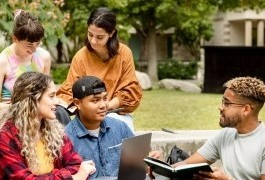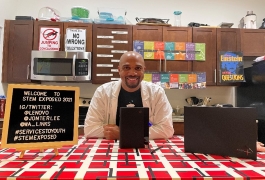Building Your Network Virtually
Last updated 1/30/2024

Start connecting now
Networking is not about finding that one perfect contact who is going to land you a dream job. It’s about getting to know people who share your interests and are open to exchanging advice and insights at any career stage. Therefore, even if you’re not currently searching for a job, the time to network is now.
“I consider networking to be building relationships with people,” says Jana Markley, senior scientist at the pharmaceuticals company AbbVie. “If you think of networking as simply reaching out to another person—maybe with a similar story but just at a different point in their journey, it becomes less intimidating.”
Networking is critical for helping you understand what sorts of positions are available and which would be the best fit for you, says Samina Azad, an ACS career consultant and the R&D manager at the Illinois-based company PLZ Aeroscience, where she specializes in consumer packaged goods (CPG) research and development. When you have questions such as, “what is it like to work in academia versus industry or government?” says Azad, “the best way to find out is by talking to people.”
The people that you meet now might vouch for you when your résumé is on the table or give you a heads-up about a new opening before it’s posted. They could also help you understand what is expected of you in a new position, which could ease new job jitters.
Make the most of a virtual meeting
Reaching out to new people, especially those senior to you, can feel intimidating whether in a conference space or cyberspace. When you attend conferences in person, you might rely on a mentor to introduce you to potential employers. You might even happen to find yourself in line for coffee behind your dream graduate advisor and (deep breath!) muster up the courage to ask a question about her recent paper.
Networking can feel unnerving, especially for introverts, says Alayna Johnson, who graduated from the University of Illinois in spring 2020 with a B.S. in chemistry. In person conferences forced Johnson to move out of her comfort zone and talk to new people. “If someone is at your poster, you have to talk,” she says. After the ACS Spring 2020 National Meeting was canceled, she still shared her poster online via ACS’s SciMeetings platform. But she didn’t feel the same push to network.
Whether online or in person, making connections at conferences will require a little extra work. Conferences open doors to linking up with potential employers through career fairs. Azad suggests that students review the list of career fair employers and begin reaching out before the conference to ask what it’s like to work at that organization.
In addition, if you learn something fascinating at a technical meeting, you can use that intriguing talk or poster as a conversation starter. Students can contact a presenter through e-mail or LinkedIn with a comment or question, says James Murray, a professor of chemistry at Immaculata University in Pennsylvania and ACS career consultant. “Maybe it will turn into a phone call or a Zoom meeting to start getting that connection tighter,” he says. “You can see what it is that both sides can bring to a particular issue, whether mentoring, or solving a scientific problem, or looking for jobs or internships.”
If you feel nervous about reaching out, remember that “everybody at that meeting had to have the same start as you,” says Murray. “The more you practice the networking and the talking to people, the better you get at it.”
Social media, now more than ever
“Social media provides students with the opportunity to connect with others and learn about career paths,” says Kate Szumanski, director of professional development and internships at Villanova University and instructor of an undergraduate course on social networking for career success. Students can still learn about a field by following on Twitter relevant hashtags and chemists whose work they admire.
Start by following professors and peers in your own department. Pay attention to whose research they retweet and which hashtags keep appearing. If you read an exciting new paper in lab, you could follow the authors on Twitter so you’ll know when they tweet about a new paper or an opening for a new student.
“Most of my social media engagement is following people on Twitter whose labs I could potentially be interested in or whose research helps me figure out what research I could be interested in,” says Javarcia Ivory, who is nearing the completion of a coterminal B.S. degree in biology with a concentration in biochemistry and master’s degree in epidemiology and clinical research at Stanford University.
Szumanski also encourages students to use LinkedIn to find connections. “Craft a message, save that message, and customize it to each individual you intend to send it to,” she says. When sending a prospective contact a message over LinkedIn, or any medium, the key is to set the right tone. “You want to be sincere and genuine so it is clear that you want a few words of advice. You are not expecting anything else of them,” says Azad.
Szumanski suggests that students follow a formula that goes something like this: My name is X. I am a student at Y. I admire your career path and would like to speak with you for 15 minutes to know more about your career journey after college.
If you’ve already met the person, it’s important to remind them of where and when you previously connected, says Azad.
Then comes the hard part: practicing patience. Szumanski has this advice: “Be patient with people. Be empathetic. Do not expect or demand an immediate response.”
When you do get the chance to speak with a new connection, find out what you most want to know about their career path and profession. Some appropriate questions might be: How did you transition from your undergraduate degree to your current position? Can you describe to me what a typical workday is like for you? Do you have any advice on ways that I could prepare myself to be competitive for a position in your field?
Keep the conversation going
Once you make a connection, you will want to maintain that relationship. If you come across an article or webpage on a common area of interest, go ahead and share it. If your contact publishes a paper or wins an award, send your congratulations.
“Just like anything else in life, you have to work at it,” says Murray. He suggests checking in every couple of months or so to ask about a contact’s work and to share your own progress. He has students, for example, who have reached out to people they connected with through meetings months later to ask if they solved particular problems they were working through and share some details of their own work. “You’ve got to carve the time out to follow up with the connections,” says Murray. “Don’t let them wither on the vine.”




